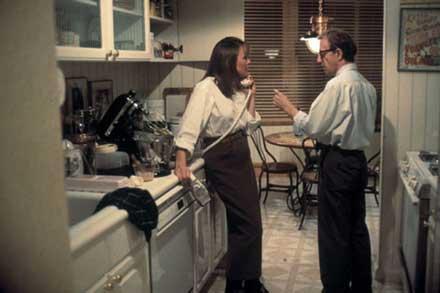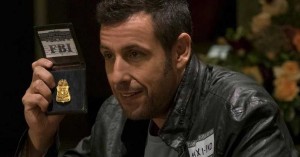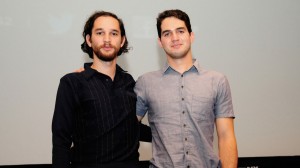From the Chicago Reader (August 27, 1993). — J.R.

MANHATTAN MURDER MYSTERY
*** (A must-see)
Directed by Woody Allen
Written by Allen and Marshall Brickman
With Allen, Diane Keaton, Alan Alda, Anjelica Huston, Jerry Adler, Joy Behar, Ron Rifkin, and Lynn Cohen.

It’s instructive to divvy up Woody Allen’s movies into “art films” and entertainments. Without too much boiling and scraping, I think you could say that the entertainments come from his first 11 years as a filmmaker, from What’s Up, Tiger Lily? (1966, now missing from the press-kit filmography) to Annie Hall (1977), while his art-film efforts extend from Interiors (1978) to Husbands and Wives (1992).
Some would argue that Broadway Danny Rose (1984) and The Purple Rose of Cairo (1985), coming halfway through the second period, belong to the entertainment category, along with “Oedipus Wrecks” (1989), his contribution to New York Stories, but I would beg to differ. (The first of these is in black and white, the second traffics in misery and pathos, and the third derives directly from Fellini’s episode in Boccaccio ’70 — the first pieces of counterevidence I’d cite.) Similarly, to those who’d claim that the “foreign movie” sketch in Everything You Always Wanted to Know About Sex (But Were Afraid to Ask) (1972) pushes it into the art-movie category, I’d maintain that there’s a world of difference between this film’s parody of Antonioni and the pastiches of the later movies. Read more
From the Chicago Reader (July 13, 2001). — J.R.

A.I. Artificial Intelligence
Rating **** Masterpiece
Directed by Steven Spielberg
Written by Spielberg and Ian Watson
With Haley Joel Osment, Jude Law, Frances O’Connor, Brendan Gleeson, William Hurt, Jake Thomas, and the voices of Jack Angel, Ben Kingsley, Meryl Streep, Robin Williams, and Chris Rock.
If the best movies are often those that change the rules, Steven Spielberg’s sincere, cockeyed, serious, and sometimes masterful realization of Stanley Kubrick’s ambitious late project deserves to be a contender. All of Kubrick’s best films fall into one vexing category — they’re strange, semi-identified objects that we’re never quite prepared for. They’re also the precise opposite of Spielberg’s films, which ooze cozy familiarity before we’ve figured out what they are or what they’re doing to us. If A.I. Artificial Intelligence — a film whose split personality is apparent even in its two-part title — is as much a Kubrick movie as a Spielberg one, this is in large part because it defamiliarizes Spielberg, makes him strange. Yet it also defamiliarizes Kubrick, with equally ambiguous results — making his unfamiliarity familiar. Both filmmakers should be credited for the results — Kubrick for proposing that Spielberg direct the project and Spielberg for doing his utmost to respect Kubrick’s intentions while making it a profoundly personal work. Read more
Commissioned and published by New York’s Metrograph Chronicle in mid-December 2019. — J.R.

“Would you forgive me if I die?” — Question asked in the first scene of Heaven Knows What

The movies of Josh and Benny Safdie are dominated by compulsively impulsive hustlers who continuously revise their own lives as well as those of everyone else in their immediate vicinities, most often with chaotically disastrous consequences for everyone concerned. Maybe because these scheming and prevaricating characters know how to tell lies and (somewhat less often) how to apologize for or cover up their various messes, they also qualify, at least some of the time, as skillful escape artists as well as stylish con men. They exasperate their colleagues, spouses, and other family members, who almost invariably wind up forgiving these crumb-bums for their lies and deceptions after hearing their shame-faced apologies, which are typically followed by further deceptions. This dizzying pattern seems to culminate in their new film Uncut Gems, which registers at times as a slapstick remake of Abel Ferrara’s Bad Lieutenant (1992) — at least if one can allow for a substitution of a certain amount of manic Jewish optimism for depressive Catholic despair. Read more





